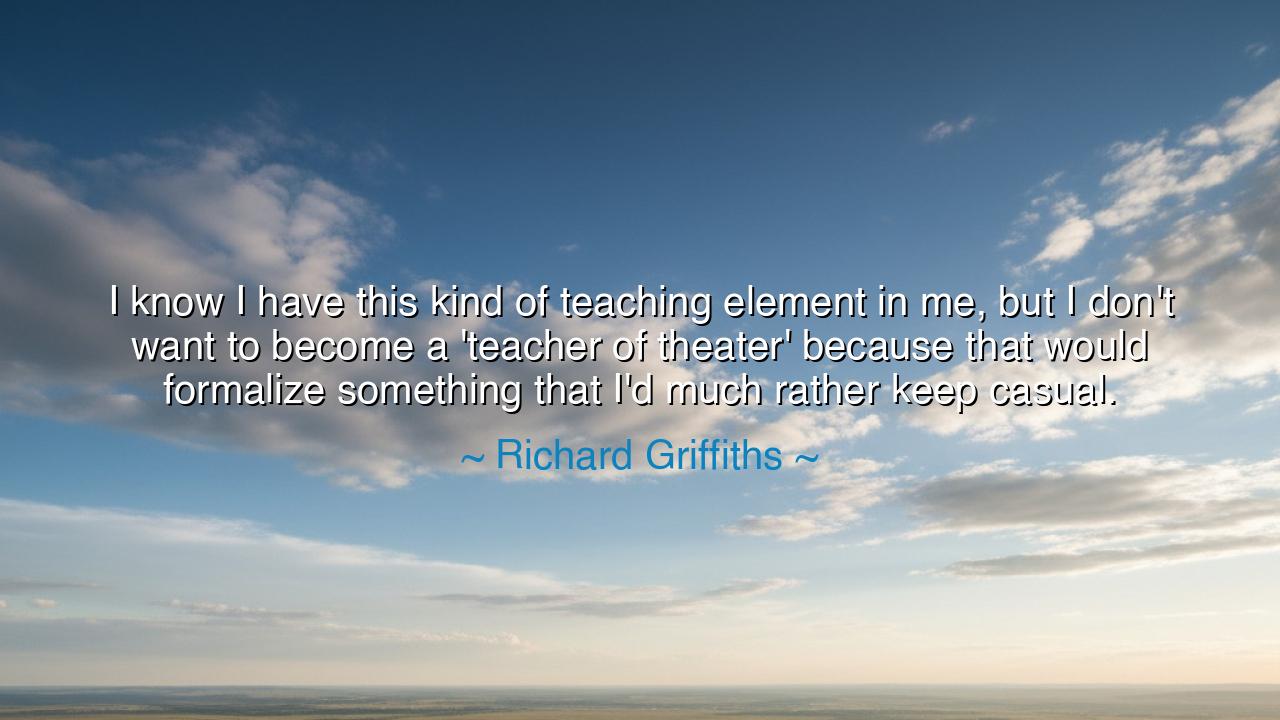
I know I have this kind of teaching element in me, but I don't
I know I have this kind of teaching element in me, but I don't want to become a 'teacher of theater' because that would formalize something that I'd much rather keep casual.






Richard Griffiths, the great actor of stage and screen, once revealed with candid humility: “I know I have this kind of teaching element in me, but I don’t want to become a ‘teacher of theater’ because that would formalize something that I’d much rather keep casual.” In this confession lies not indifference to teaching, but a reverence for its spirit. He speaks of the mysterious gift that some carry within them: the ability to guide, to inspire, to awaken others. Yet he feared that to clothe it in formality, to bind it within the rigid walls of an institution, might diminish its power. For he cherished the casual—that sacred, unforced passing of wisdom from one heart to another, born of spontaneity, intimacy, and freedom.
The origin of this thought lies in Griffiths’s own life as a performer. Known for his brilliance in roles ranging from Shakespearean comedy to contemporary drama, and remembered by many as the tender but formidable Uncle Vernon in the Harry Potter films, he was above all a man who lived his craft, not as theory, but as lived experience. To him, theater was not merely technique but soul. And though he possessed within him the teaching element, he feared that the classroom might fossilize what should remain alive and fluid. His teaching, he believed, must come through example, through presence, through the living exchange of performer and audience, mentor and apprentice.
History too has seen such spirits. Consider Socrates, who refused to write down his teachings, believing that the written word would freeze thought, stripping it of vitality. Instead, he taught in conversation, casual yet profound, walking the streets, asking questions, sowing wisdom in the daily encounters of life. Socrates, like Griffiths, knew that the deepest truths are best transmitted not through rigid formalities, but through the spark of shared dialogue. It is this casual passing of wisdom that often shapes generations more powerfully than the most ordered institutions.
The meaning is both emotional and heroic. Griffiths reminds us that not all teaching must bear the title of teacher. Sometimes the greatest lessons come from those who never claim authority, but who live with such authenticity that their very presence becomes instruction. The actor who masters his craft teaches the younger actor by performance. The parent, though not a formal instructor, teaches the child by example. The friend who speaks with honesty in casual conversation teaches more than the lecturer who drones in abstractions. Thus, Griffiths’ resistance to formalization is not rejection of teaching, but a desire to preserve its living essence.
This wisdom also speaks to a danger of our age: the tendency to over-formalize, to institutionalize every gift until it becomes sterile. But true wisdom is often shared in laughter, in stories told at the fire, in advice whispered backstage, in lessons that come unannounced. To “keep it casual” is not to diminish the importance of knowledge, but to honor the form in which it thrives best: alive, unforced, human.
The lesson for us is luminous: if you have within you a teaching spirit, do not wait for titles or classrooms. Share your knowledge in daily life, freely and naturally. Do not imagine that wisdom requires a podium; it may flow from a conversation at a café, from a moment of kindness, from a story told at just the right time. Remember that you teach not only with your words, but with your example. As Griffiths himself taught countless students of theater—not in a classroom, but in every performance he gave—you too can become a guide without ever being called “teacher.”
Practically, this means embracing informal mentorship. If you see someone struggling, offer your insight. If you know a craft, share it openly, without pride or fear. If you live with integrity, your life itself will instruct others. Do not underestimate the power of the casual, for it often penetrates the heart more deeply than the formal. And do not fear that your teaching lacks weight because it lacks structure—remember Griffiths, who taught through the brilliance of his art and the warmth of his presence.
Thus, his words endure as both wisdom and challenge: to teach is not always to formalize. Sometimes, it is simply to live, to share, to let the light of your knowledge spill naturally into the lives around you. And in that, you may discover that your greatest lessons are taught not when you intend to instruct, but when you simply embody truth with sincerity and joy.






AAdministratorAdministrator
Welcome, honored guests. Please leave a comment, we will respond soon